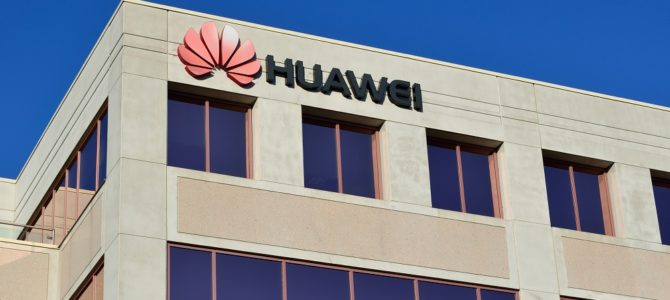
If there is a Chinese word for “chutzpah” a new lawsuit against the U.S. government by Huawei surely fits the bill.
Huawei is the world’s largest telecommunications equipment manufacturer, and the West’s chief competitor for dominance in the all-critical fifth-generation (5G) technology. It happens to also be a de facto, if not de jure, organ of the Chinese government.
Huawei seeks to overturn U.S. legislation that prohibits our federal government from using its equipment. This is a blatant attempt by an allegedly vital cog in the Chinese Communist Party’s (CCP) intelligence apparatus to avail itself of rights China would never confer on U.S. corporations––let alone its own citizens––in a bid to thwart America’s national security interests.
Huawei Poses a Threat That Should Not Be Ignored
The threat Huawei poses should its equipment be used in America broadly, and our government specifically, is acute. In a 2018 hearing in front of the Senate Intelligence Committee, the heads of the CIA, FBI, NSA, and the director of national intelligence all counseled Americans not to purchase products, or services from Huawei.
As FBI Director Christopher Wray argued at the time, entrance of a company supported by an adversarial regime into the U.S. market would enable it to “exert pressure or control” over our vital telecommunications infrastructure, “maliciously modify or steal information,” and “conduct undetected espionage.”
The issue at hand concerns Section 889 of the 2019 National Defense Authorization Act, which stipulates that:
The head of an executive agency may not—
(A) procure or obtain or extend or renew a contract to procure or obtain any equipment, system, or service that uses covered telecommunications equipment or services as a substantial or essential component of any system, or as critical technology as part of any system; or
(B) enter into a contract (or extend or renew a contract) with an entity that uses any equipment, system, or service that uses covered telecommunications equipment or services as a substantial or essential component of any system, or as critical technology as part of any system.
This includes telecommunications equipment and services provided by Huawei.
The U.S. government has justified this position in hearings, public documents and briefings. It has asserted that coordination between the Communist Party and the telecommunications industry in general, and Huawei in particular, is aimed at furthering China’s objectives in the realms of cyber warfare, intelligence, and military advancement vis-à-vis the West.
This issue was brought into stark relief in a statement Sen. Tom Cotton delivered in June 2018 in support of the Section 889 amendment to the NDAA that he co-sponsored:
Earlier this year I asked the directors of all four major intelligence agencies-the CIA, the NSA, the FBI, and the DIA-if they would use products made by Huawei or ZTE. None of them raised their hand. And I said, well, that may be unfair, you are the leader of an American intelligence agency. What about members of your family, or your neighbors, your friends, church members. Not a single one of them recommended that they use a Huawei or ZTE product. I hope all of you up in the gallery are not using a Huawei or ZTE product, if you are, you might want to go out and buy a different one.
And that’s because these companies are dangerous to our national security and to your privacy. Huawei and ZTE are nothing more than extensions of the Chinese Communist Party. Huawei’s CEO was an engineer for the People’s Liberation Army. The company’s livelihood consists largely of a steady stream of government contracts. And its greatest claim to fame is shamelessly stealing the secrets of American companies. That’s why it’s under the investigation by the Department of Justice for that and for violating sanctions against Iran.
Mere months later, Huawei CFO Meng Wanzhou was arrested in Canada. She faces extradition to the United States, where she, Huawei, and two of its affiliates have been charged with money laundering, conspiracy to defraud the United States, obstruction of justice, and violating Iran sanctions.
The Constitutionality of Section 889
Huawei claims Section 889 is unconstitutional. The firm’s lead lawyer contends that the U.S. government has violated “the Bill of Attainder Clause, the Due Process Clause, and the separation of powers embodied in the Vesting Clauses.”
The complaint opens by invoking Federalist 48 and “The Papers of Alexander Hamilton,” elucidating the importance of the aforementioned constitutional protections, and claiming that Section 889 “blacklists Huawei and bars it from significant sectors of the U.S. telecommunications market, all without giving Huawei a fair hearing at which it could be informed of and confront the accusations made against it.” Huawei bases its Vesting Clause argument on the idea that the legislative branch is engaging in the “usurpation of the charging and adjudicative powers reserved by the Constitution to the executive and judicial branches.”
While James Madison and Alexander Hamilton roll over in their graves at this gambit, General Secretary of the Chinese Communist Party Xi Jinping must be falling over laughing. For, in China, all such powers are effectively under his sole purview.
Outgoing Deputy Attorney General Rod Rosenstein accurately described the Chinese judicial system in a recent speech. Rosenstein’s characterization of the Chinese system is instructive:
In China…the Supreme Court urged government officials to actively resist ‘Western-style’ ‘judicial independence,’ deriding it as ‘erroneous’ and ‘mistaken.’ The Chinese Communist Party sits above the government. In January, a party directive instructed the country’s courts to protect the Party’s ‘political security.’ Instead of maintaining independence from the executive branch, the Chinese judiciary’s duty is to further Communist Party goals. The party controls the appointment of all judges and even dictates some of their rulings.
The Chinese system effectively presumes guilt when a defendant stands charged with a crime. Moreover, the presumption is all but irrebuttable. Chinese judges receive the government’s evidence before trial, without any opportunity for comment or cross-examination by the defense. Live testimony is offered only rarely. There is little to no opportunity to impeach witnesses. Prosecutors rarely lose a case.
In China, forms of extrajudicial pretrial detention are enshrined in law. Last September, the former President of INTERPOL, Meng Hongwei, was forcibly detained by his own government, without explanation. Meng has been reportedly detained under a new form of custody called liuzhi or ‘retention in custody.’ Under liuzhi, a suspect is held incommunicado at an undisclosed location and denied access to legal counsel and family for as long as six months without charges.
In Xinjiang province, Chinese law allows the extrajudicial mass detention of citizens who are ethnic Uighurs, a minority population native to the province. Today, more than one million Uighurs and other minorities reportedly are detained in internment camps. They are forced to renounce their culture and religion, and they face political ‘reeducation.’ The province’s law authorizes the arrest of anyone for violations that include expressing an allegiance to Uighur culture and reading prohibited religious books. Many people have been arrested and detained for long periods of time, without charge, trial, or due process.
(Emphasis and link mine.)
Separation Of Powers?
In simple terms: There is no concept of separated powers in China. All powers reside in the Communist Party under Xi. China’s treatment of the Uighur population represents one massive bill of attainder without due process––exactly what Huawei is challenging in U.S. courts.
So while Chinese companies have legal recourse with the benefit of U.S. constitutional protections, including our judicial system, American companies have no such recourse in China. U.S. firms have nowhere to go to recover the estimated annual $225 to $600 billion lost in counterfeit goods, pirated software, and theft of trade secrets at China’s hands.
Unless President Trump’s trade negotiations or World Trade Organization reforms are enacted, the best American companies may hope for outside of implementing their own security protocols is the Justice Department’s November 2018 initiative to combat Chinese economic espionage. It is unclear if this effort will fully protect against or at a minimum deter China’s malign behavior, but it is a move in the right direction.
As for the prospects of Huawei’s lawsuit, in a parallel case, Kaspersky Labs––the Russian-based cybersecurity company whose goods and services were similarly prohibited from use by federal agencies under the 2018 National Defense Authorization Act (NDAA)––failed in its bid to block a similar provision on bill of attainder grounds.
Yet we need to understand that even if Huawei fails in its litigation––which its Chairman Guo Ping has called a “proper and last resort”––it will serve two other purposes: 1) It may allow Huawei through the discovery process to gain valuable insight into how the United States identifies and investigates threats posed by Chinese firms (although the U.S. may benefit here too); and 2) It furthers public relations efforts to convince skeptical countries to use its products in building critical telecommunications infrastructure, including 5G network technology.
On the latter point, Huawei is seeking to defeat the United States’ worldwide campaign to dissuade allies from using Huawei’s equipment, given the national security threats it poses. At the February 2019 Munich Security Conference, Vice President Mike Pence asserted:
The United States has…been very clear with our security partners on the threat posed by Huawei…as Chinese law requires them to provide Beijing’s vast security apparatus with access to any data that touches their network or equipment…America is calling on all our security partners to be vigilant and to reject any enterprise that would compromise the integrity of our communications technology or our national security systems.
Secretary of State Mike Pompeo more pointedly suggested that if Huawei “equipment is co-located in places where we have important American systems, it makes it more difficult for us to partner alongside [such nations].”
The campaign reached a crescendo at the telecommunications industry’s MWC Barcelona trade show, the largest such fair in the world. There, the United States sent officials from the departments of State, Defense, and Commerce, along with Federal Communications Chair Ajit Pai, to present their case against Huawei to more than 100,000 industry officials from across the world. Yet Germany and the UK, two of the United States’s “Five Eyes” intelligence partners, have been somewhat reticent to accede to America’s request, a division Huawei will likely seek to exploit.
Huawei’s lawsuit can be seen as part of a counteroffensive. In recent weeks, the company has engaged in a broad lobbying campaign, including purchasing full-page advertisements in major U.S. newspapers and European publications, executing a charm offensive through featuring its executives in Western media appearances, and apparently attempting to co-opt Western media figures through lucrative job offers in Huawei’s communications department and even all-expenses-paid trips to China.
The big takeaway from Huawei’s litigation is this: China, directly and through its state-controlled entities, will exploit any and every avenue available to it, including the West’s own freedoms and protections, in order to advance China’s strategic aims. One should expect no less from a formidable and ambitious adversary. The United States must prove it is up to the challenge.
Calls from lawmakers to impose further restrictions barring Huawei from our electrical grid, and the Trump administration’s reported consideration of a ban on U.S. telecommunication companies’ use of Chinese equipment, on top of ongoing litigation and diplomatic pressure contra Huawei are well-taken. We must double down on these efforts. Given the magnitude and nature of the threat posed by Chinese dominance over communications systems both in the United States and abroad, it is essential that we remain clear-eyed in seeing the risks posed by this threat, and act vigilantly to defeat it.








